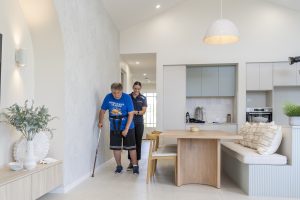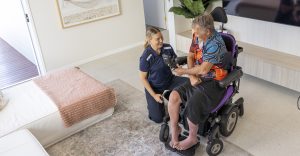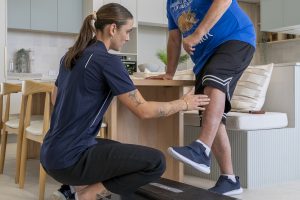
The National Disability Insurance Scheme (NDIS) has created new opportunities for Australians living with disabilities to access the care and support they need. Among the most valuable and flexible services offered within the NDIS are mobile and in-home therapy options. These allow participants to receive personalised healthcare in the comfort of their homes, eliminating barriers to access and improving outcomes.
This article explores how mobile and in-home therapy services, including exercise physiology, podiatry, and dietetics, address the unique challenges faced by NDIS participants and why these tailored solutions are a critical component of achieving long-term health and independence.
Challenges Faced by NDIS Participants Accessing Traditional Therapy
For many NDIS participants, accessing care at traditional clinics can be a significant obstacle. These challenges often create gaps in service delivery, leading to less consistent and effective treatment.
Transportation and Accessibility
Traveling to appointments can be daunting for participants with mobility challenges or those living in remote areas. Public transport options are often limited, and private transport can be expensive and time-consuming.
These barriers may result in missed appointments, inconsistencies in care, or increased stress for participants and their families.
Scheduling and Routine Disruptions
Traditional clinics operate within fixed hours that may not align with participants’ schedules or routines. For carers managing work, school, or other responsibilities, this inflexibility can make it difficult to maintain regular therapy appointments.
Clinic Environments
While clinics are designed to provide care, they can feel unfamiliar or overwhelming, particularly for participants who thrive in calm, familiar surroundings. This can limit the effectiveness of therapy sessions and create additional anxiety.
The Benefits of Mobile and In-Home Therapy Services

Mobile and in-home therapy services eliminate these barriers by bringing healthcare directly to participants. This approach provides numerous advantages that make therapy more accessible, consistent, and effective.
Convenience and Accessibility
In-home therapy allows participants to receive care without the stress of organising transportation or traveling to a clinic. For participants living in rural or regional areas, mobile services eliminate long commutes and ensure equitable access to care.
For carers, this convenience means less disruption to their routines, enabling them to focus on supporting their loved ones without the added burden of logistical planning.
Personalised and Tailored Care
Every NDIS participant has unique needs, and mobile therapy services provide the flexibility to deliver care that is tailored to their goals and lifestyle. For example:
- Occupational therapists can help participants navigate their home safely and suggest modifications to improve accessibility.
- Physiotherapists can guide participants through mobility exercises using their own furniture and living space.
- Exercise Physiologists can design fitness programs that integrate participants’ daily routines and use equipment available in their homes.
- Podiatrists can assess footwear, walking surfaces, and home environments to address foot health and mobility challenges more effectively.
- Dietitians can offer practical advice in the context of participants’ existing kitchen setups, making healthy eating recommendations that are realistic and actionable.
This level of customisation ensures that therapy is meaningful, relevant, and directly applicable to the participant’s everyday life.
Comfortable, Familiar Environments
Receiving care at home allows participants to relax and engage more effectively in therapy sessions. A familiar setting can reduce anxiety and create a stronger connection between the participant and their therapist, leading to better long-term results.
Additionally, therapy conducted in the participant’s own environment allows for practical solutions to real-world challenges. For example:
- Exercise physiologists can guide participants through exercises that account for available space and home equipment.
- Podiatrists can recommend adjustments to improve mobility in the home, such as using assistive devices.
- Dietitians can tailor meal plans to suit the participant’s dietary preferences and budget while addressing specific nutritional needs.
Tailored Solutions for Every Stage of Your Healthcare Journey

Mobile and in-home therapy goes beyond convenience; it is about delivering care that evolves alongside participants as they work toward their goals. Team Rehab Solutions takes a personalised approach to ensure participants feel supported at every stage of their healthcare journey.
Comprehensive Assessments
At the start of their therapy journey, participants receive a thorough assessment to identify their unique needs and priorities. This includes evaluating their physical capabilities, dietary requirements, and any mobility challenges they face at home.
These assessments form the foundation of a therapy plan that is both practical and achievable.
Customised Therapy Plans
Therapists develop tailored programs that align with participants’ goals while fitting seamlessly into their daily lives. Examples include:
- Exercise programs to improve strength, balance, and mobility, designed to be performed in the participant’s living space.
- Foot health routines and footwear recommendations to support better mobility and prevent complications.
- Nutritional guidance that takes into account personal preferences, cultural considerations, and any medical conditions such as diabetes or coeliac disease.
Collaboration with Allied Health Assistants
Participants also benefit from the support of allied health assistants, who work under the guidance of therapists to ensure therapy goals are consistently met. This collaborative approach provides continuity of care and reinforces positive progress.
Ongoing Monitoring and Adaptation
As participants progress, their therapy plans are regularly reviewed and adjusted to reflect their evolving needs. Whether it’s introducing more challenging exercises, addressing new mobility concerns, or refining dietary plans, the focus remains on helping participants achieve sustainable outcomes.
This dynamic approach ensures that therapy is always relevant and impactful, helping participants maintain long-term health and independence.
Why Choose Team Rehab Solutions?
At Team Rehab Solutions, we are committed to providing high-quality, mobile and in-home therapy services that make a meaningful difference in the lives of NDIS participants. Our expert team of exercise physiologists, podiatrists, and dietitians works closely with each participant to deliver care that is flexible, personalised, and goal-oriented.
By choosing Team Rehab Solutions, you’ll gain access to compassionate professionals who understand the importance of tailoring therapy to fit your unique needs. Whether you’re focusing on mobility, fitness, nutrition, or overall well-being, we’re here to support you every step of the way.
Take the First Step Toward Better Health
Discover the difference mobile and in-home therapy can make for you or your loved one. Contact Team Rehab Solutions today to learn more about our services and how we can help you achieve your goals.
- Call us on 1300 469 733
- Submit an enquiry through our Contact page.
Let’s work together to create a healthier, more independent future.
